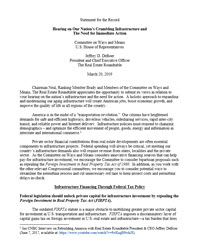Repealing FIRPTA, streamlining permit procedures and passing infrastructure financing measures will help spur infrastructure improvements and contribute to economic growth, according to recommendations submitted this week by The Real Estate Roundtable to the House Ways and Means Committee. (Roundtable Statement for the Record)
 |
Repealing FIRPTA, streamlining permit procedures and passing infrastructure financing measures will help spur infrastructure improvements and contribute to economic growth, according to recommendations submitted this week by The Real Estate Roundtable to the House Ways and Means Committee. (Roundtable Statement for the Record) |
The Roundtable recommendations include the following:
- Unlocking private capital by repealing the Foreign Investment in Real Property Tax Act (FIRPTA). FIRPTA imposes a discriminatory layer of capital gains tax on foreign investment—a tax burden that does not apply to any other asset class. Repealing FIRPTA would serve as a market-driven catalyst to finance improvements in our nation’s infrastructure.
- Streamlining the permitting process. A report by the nonprofit organization Common Good estimates that a six-year delay in starting construction on public projects costs the nation more than $3.7 trillion. Permit delays dampen private sector investment and add to the overall costs of infrastructure projects.
- Increasing the federal gas “user fee” in a responsible and sustainable manner. The gas user fee (18.4-cents a gallon) that capitalizes the Highway Trust Fund has not been raised since 1993. The Roundtable supports proposals to sustain the HTF by increasing the user fee by five cents a year for the next five years, and indexing it to inflation thereafter.
- Revising IRS “volume caps” and other limitations on private-activity bonds (PABs). Congress should broaden availability of these tax-exempt municipal bonding tools. Bipartisan measures that advance PAB financing, including the Move America Act (H.R. 1508), the Public Buildings Renewal Act ( H.R. 1251), and the BUILD Act (S. 352), warrant close analysis.
- Improving the Transportation Infrastructure Finance Innovation Act (TIFIA) loan program through measures such as the RAPID Act (S. 353). Congress should consider establishing a similar credit enhancement program to encourage public-private partnerships to help repair an aging pipeline grid and remediate gas leaks that impact climate change.
DeBoer discussed the role of public-private partnerships to develop infrastructure projects on CNBC’s Squawk Box in June 2017. “There’s a lot of capital that wants to invest in infrastructure,” DeBoer said. (Roundtable Weekly, June 9, 2017).
Ways and Means Chairman Richard Neal (D-MA) has indicated he intends for his committee to consider an infrastructure bill this spring.
